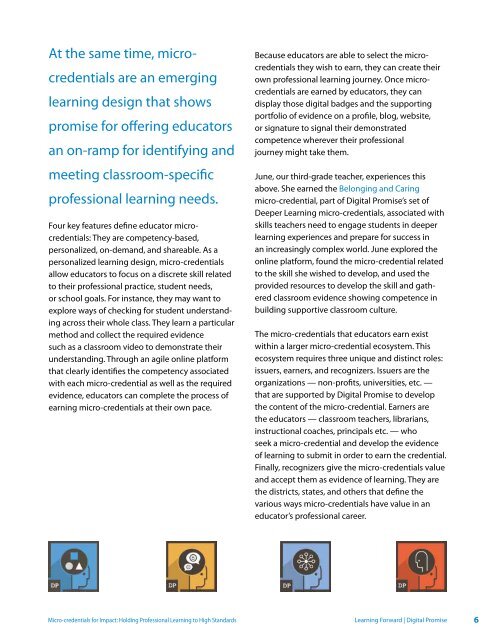Micro-credentials for Impact
2iV7zqI
2iV7zqI
Create successful ePaper yourself
Turn your PDF publications into a flip-book with our unique Google optimized e-Paper software.
At the same time, micro-<br />
<strong>credentials</strong> are an emerging<br />
learning design that shows<br />
promise <strong>for</strong> offering educators<br />
an on-ramp <strong>for</strong> identifying and<br />
meeting classroom-specific<br />
professional learning needs.<br />
Four key features define educator micro<strong>credentials</strong>:<br />
They are competency-based,<br />
personalized, on-demand, and shareable. As a<br />
personalized learning design, micro-<strong>credentials</strong><br />
allow educators to focus on a discrete skill related<br />
to their professional practice, student needs,<br />
or school goals. For instance, they may want to<br />
explore ways of checking <strong>for</strong> student understanding<br />
across their whole class. They learn a particular<br />
method and collect the required evidence<br />
such as a classroom video to demonstrate their<br />
understanding. Through an agile online plat<strong>for</strong>m<br />
that clearly identifies the competency associated<br />
with each micro-credential as well as the required<br />
evidence, educators can complete the process of<br />
earning micro-<strong>credentials</strong> at their own pace.<br />
Because educators are able to select the micro<strong>credentials</strong><br />
they wish to earn, they can create their<br />
own professional learning journey. Once micro<strong>credentials</strong><br />
are earned by educators, they can<br />
display those digital badges and the supporting<br />
portfolio of evidence on a profile, blog, website,<br />
or signature to signal their demonstrated<br />
competence wherever their professional<br />
journey might take them.<br />
June, our third-grade teacher, experiences this<br />
above. She earned the Belonging and Caring<br />
micro-credential, part of Digital Promise’s set of<br />
Deeper Learning micro-<strong>credentials</strong>, associated with<br />
skills teachers need to engage students in deeper<br />
learning experiences and prepare <strong>for</strong> success in<br />
an increasingly complex world. June explored the<br />
online plat<strong>for</strong>m, found the micro-credential related<br />
to the skill she wished to develop, and used the<br />
provided resources to develop the skill and gathered<br />
classroom evidence showing competence in<br />
building supportive classroom culture.<br />
The micro-<strong>credentials</strong> that educators earn exist<br />
within a larger micro-credential ecosystem. This<br />
ecosystem requires three unique and distinct roles:<br />
issuers, earners, and recognizers. Issuers are the<br />
organizations — non-profits, universities, etc. —<br />
that are supported by Digital Promise to develop<br />
the content of the micro-credential. Earners are<br />
the educators — classroom teachers, librarians,<br />
instructional coaches, principals etc. — who<br />
seek a micro-credential and develop the evidence<br />
of learning to submit in order to earn the credential.<br />
Finally, recognizers give the micro-<strong>credentials</strong> value<br />
and accept them as evidence of learning. They are<br />
the districts, states, and others that define the<br />
various ways micro-<strong>credentials</strong> have value in an<br />
educator’s professional career.<br />
<strong>Micro</strong>-<strong>credentials</strong> <strong>for</strong> <strong>Impact</strong>: Holding Professional Learning to High Standards<br />
Learning Forward | Digital Promise<br />
6


